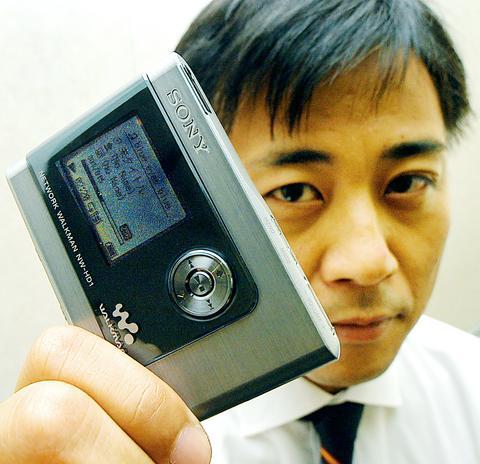When Sony Corp President Kunitake Ando showed off the new Walkman meant to counter the assault by Apple's iPod portable music player, he held the prized gadget at the gala event upside down.
That may have been a bad omen.

PHOTO: AP
The iPod is proving a colossal hit on the Japanese electronics and entertainment giant's own turf. The tiny white machine is turning into a fashion and cultural icon in Japan, much the same way it won a fanatic following in the US.
Apple Computer Inc has launched a marketing campaign in Japan with catchy TV spots and ads covering Tokyo trains. It opened its first Apple store in Tokyo's glitzy Ginza late last year and is opening another in Osaka this month.
"I only want something I can believe in," said design-school student Hiroyuki Sakurai, 21, who was all smiles after buying an iPod recently at the bustling Apple store. "It's a question of sensibility."
When the colorful iPod mini went on sale in July, more than 1,000 people waited for the store to open. The waiting list for minis is now several weeks long.
Although Apple doesn't release regional sales figures, six of the top-selling eight music players in Japan are iPod models, according to Gfk Japan, a market research company.
Its white earbuds are so well-known, just wearing them on Tokyo streets can make passers-by smile approvingly. IPod chat pervades Internet bulletin boards. The mini is such a hit it's being offered as a prize in lotteries sponsored by drink and candy companies here.
Porter bags, a cool brand among Japanese youngsters, sells iPod carrying cases. Rock band Orange Range and hip-hop musician Makoto Sakurai are iPod users.
"First of all, the iPod design is cute," said movie star Shosuke Tanihara, who listens to Prince and Janet Jackson with his iPod while cooking pasta at home or driving his Mercedes. "Japanese electronics products may come packed with a lot of functions, but they usually have more buttons and their designs are cluttered."
The largest, 40GB version, sells for ?4,940 (US$406).
Last month, Sony unveiled the hard-drive Network Walkman -- a product that goes head-to-head against the iPod and promises longer battery life.
It was at that event Ando showed it the wrong side up, an error that has Apple officials smirking. Sony will not release sales figures for the Network Walkman, but says they're meeting targets.
Sony marketing manager Atsushi Kubota said his company wants to promote a wide range of music players in the Walkman lineup, including various types of disks and memory cards, not just the hard drive. Global Walkman sales still total US$20 million a year, according to Sony, compared with more than 3.7 million iPods shipped worldwide so far.
"We want to push the advantages of each type of medium," Kubota said.
"To come up with an innovative gadget that links well with software -- that's something Sony should have done," Yamamoto said.

Conflict with Taiwan could leave China with “massive economic disruption, catastrophic military losses, significant social unrest, and devastating sanctions,” a US think tank said in a report released on Monday. The German Marshall Fund released a report titled If China Attacks Taiwan: The Consequences for China of “Minor Conflict” and “Major War” Scenarios. The report details the “massive” economic, military, social and international costs to China in the event of a minor conflict or major war with Taiwan, estimating that the Chinese People’s Liberation Army (PLA) could sustain losses of more than half of its active-duty ground forces, including 100,000 troops. Understanding Chinese

The Ministry of Foreign Affairs (MOFA) yesterday said it is closely monitoring developments in Venezuela, and would continue to cooperate with democratic allies and work together for regional and global security, stability, and prosperity. The remarks came after the US on Saturday launched a series of airstrikes in Venezuela and kidnapped Venezuelan President Nicolas Maduro, who was later flown to New York along with his wife. The pair face US charges related to drug trafficking and alleged cooperation with gangs designated as terrorist organizations. Maduro has denied the allegations. The ministry said that it is closely monitoring the political and economic situation

UNRELENTING: China attempted cyberattacks on Taiwan’s critical infrastructure 2.63 million times per day last year, up from 1.23 million in 2023, the NSB said China’s cyberarmy has long engaged in cyberattacks against Taiwan’s critical infrastructure, employing diverse and evolving tactics, the National Security Bureau (NSB) said yesterday, adding that cyberattacks on critical energy infrastructure last year increased 10-fold compared with the previous year. The NSB yesterday released a report titled Analysis on China’s Cyber Threats to Taiwan’s Critical Infrastructure in 2025, outlining the number of cyberattacks, major tactics and hacker groups. Taiwan’s national intelligence community identified a large number of cybersecurity incidents last year, the bureau said in a statement. China’s cyberarmy last year launched an average of 2.63 million intrusion attempts per day targeting Taiwan’s critical

AGING: As of last month, people aged 65 or older accounted for 20.06 percent of the total population and the number of couples who got married fell by 18,685 from 2024 Taiwan has surpassed South Korea as the country least willing to have children, with an annual crude birthrate of 4.62 per 1,000 people, Ministry of the Interior data showed yesterday. The nation was previously ranked the second-lowest country in terms of total fertility rate, or the average number of children a woman has in her lifetime. However, South Korea’s fertility rate began to recover from 2023, with total fertility rate rising from 0.72 and estimated to reach 0.82 to 0.85 by last year, and the crude birthrate projected at 6.7 per 1,000 people. Japan’s crude birthrate was projected to fall below six,